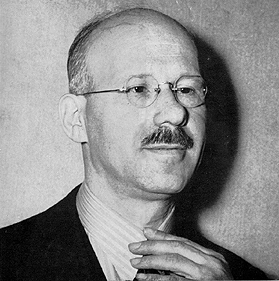

From The Bulletin Index 16 May 1940.
Hospitals
are big business. Though few are organized for profit, they rank with the
four U. S. industries which have capital investments exceeding
$3,000,000,000 (local share in that grand total: upwards of $50,000,000).
Having many of the characteristics of a business enterprise, hospital
administration calls for a maximum application of efficiency and financial
sense. Thus many hospital directors are primarily business men.
No exception is brisk, capable Abraham Oseroff, retiring president
of the Hospital Association of Pennsylvania who last week keynoted the
group's 19th annual convention here. Director of Montefiore Hospital and
one of the East's topflight hospital executives, mustached Administrator
Oseroff was also the prime mover in bringing group hospitalization to
Pittsburgh. Main theme of last week's convention: group hospitalization
and its effect on hospital financing.
Time was when a sick man went to a hospital as a last resort--and to
die. Today one family out of five goes to the hospital annually. Some
8,000,000 U. S. citizens are hospital in-patients (bed patients) yearly;
another 20,000,000 are out- or dispensary patients. Thanks to a group
hospitalization system whereby hospitals, patients and doctor can get
together on costs with self-respect and mutual benefit, Director Oseroff
foresees a growing tendency to "use the hospital not only to regain health
but to retain it."
Though 5,000,000 U. S. citizens are now covered by group
hospitalization, the 1,000 administrators, trustees and staff members at
last week's convention believe that this is only a bare beginning--that
the U. S. has a potential market of at least 25,000,000 persons. Aware
that adequate medical care and hospitalization have not yet reached all
who need it, Director Oseroff pointed out significantly that "medical care
insurance, now in the experimental stage, must have its premiums adapted
to the ability of the masses to pay."
Other convention highspots:
National President Fred Carter declared the AHA will not oppose President Roosevelt's proposal for Federal construction of 50 new hospitals in rural and economically depressed areas. Said he: "It may be a foot-in-the-door proposition for further governmental penetration into the health and hospital picture, but we consider it the lesser of two evils."
"It is believed that the President's proposal need not give the voluntary hospitals of Pennsylvania any immediate concern; nevertheless, we are making a study of the present distribution of hospitals in the state in relation to the needs of the population, just as a matter of preparedness."--Superintendent Mark Eichenlaub, West Penn Hospital.
The Man. Born in Pittsburgh 49 years ago, slim,
business-like Abraham Oseroff got his B.S. at the University of
Pennsylvania, his M.A. at Pitt, was a first lieutenant during World War I.
Employed by R. H. Macy & Co. (department stores) in 1920, he was soon
made
general manager of the London office, impressed the great & good Jewish
Philanthropist Jesse Straus with his business ability. He was also board
member and managing director of Abraham & Strauss, Ltd., London. His
first interest in hospital work came earlier, in 1917, when New York's
Mayor Mitchell made him a member of his Advisory Board, Committee on Child
Institutions, and delegate to the National Conference of Charities &
Correction.
Brought back to Pittsburgh in 1927 to be director of
Montefiore, he is one of Pittsburgh's most active civic leaders. Author
of several books on housing, he is a director of the Pittsburgh Housing
Association, serves as trustee or committee member of such groups as
Juvenile Court, Citizen's Committee on Social Study ( Buhl Foundation),
General Health Council. Married eight years ago, father of three children
he has photography as his main hobby. He
believes no community is more modern than its hospitals.
Probably the most important of his many contributions to Pittsburgh has been his untiring work as secretary of Western Pennsylvania's Hospital Service Association, a non-profit, hospitalization insurance plan with 220,000 members. Operating today with the tacit approval of the Allegheny County Medical Society, this Ass'n sells protection to local employees' groups on three bases: 1-- 75 cents a month for one; 2-- $1.40 a month for man & wife; 3-- $1.75 a month for man, wife and dependents under 19. Benefits: up to 21 days hospitalization a year for each family member covered; operating room, anaesthetist, X-ray and dressings in reasonable quantities. The plan pays delivery room and hospital bills for babies arriving twelve months after the member joined. Ward service is available at lesser rates. If a private room is desired, the plan pays $4.50 a day toward it.
Any Republican can supply numerous reasons as to why tycoons are now loath to donate millions to hospitals, as was their happy wont until a decade ago. Whatever the reason, the fact remains that hospitals can no longer count on outside contributions to keep them financially stable. From the administrator's point of view, the chief significance of group hospitalization lies in the fact that such non-profit organizations now pay around $30,000,000 annually to American hospitals which cooperate, assuring them a degree of sound financing.